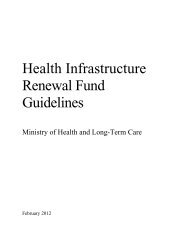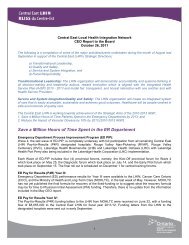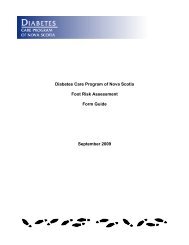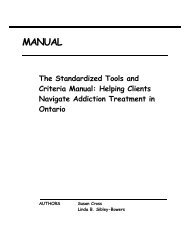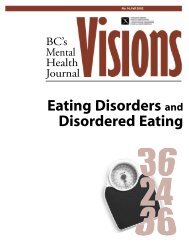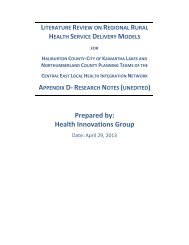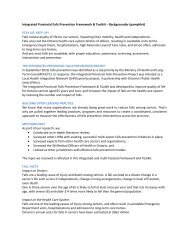CDE Appendix 1 Literature Review - Central East Local Health ...
CDE Appendix 1 Literature Review - Central East Local Health ...
CDE Appendix 1 Literature Review - Central East Local Health ...
You also want an ePaper? Increase the reach of your titles
YUMPU automatically turns print PDFs into web optimized ePapers that Google loves.
The Culture, Diversity and Equity Project: <strong>Literature</strong> <strong>Review</strong><br />
<strong>Appendix</strong> 5:<br />
AMCD Multicultural Counselling Competencies<br />
I. Counselor Awareness of Own Cultural Values and Biases<br />
A. Attitudes and Beliefs<br />
1. Culturally skilled counsellors believe that cultural self-awareness and sensitivity to one's own cultural heritage is<br />
essential.<br />
2. Culturally skilled counsellors are aware of how their own cultural background and experiences have influenced<br />
attitudes, values, and biases about psychological processes.<br />
3. Culturally skilled counsellors are able to recognize the limits of their multicultural competency and expertise.<br />
4. Culturally skilled counsellors recognize their sources of discomfort with differences that exist between themselves<br />
and clients in terms of race, ethnicity and culture.<br />
B. Knowledge<br />
1. Culturally skilled counsellors have specific knowledge about their own racial and cultural heritage and how it<br />
personally and professionally affects their definitions and biases of normality/abnormality and the process of<br />
counselling.<br />
2. Culturally skilled counsellors possess knowledge and understanding about how oppression, racism,<br />
discrimination, and stereotyping affect them personally and in their work. This allows individuals to acknowledge<br />
their own racist attitudes, beliefs, and feelings. Although this standard applies to all groups, for White counsellors it<br />
may mean that they understand how they may have directly or indirectly benefited from individual, institutional, and<br />
cultural racism as outlined in White identity development models.<br />
3. Culturally skilled counsellors possess knowledge about their social impact upon others. They are knowledgeable<br />
about communication style differences, how their style may clash with or foster the counselling process with persons<br />
of color or others different from themselves based on the A, B and C, Dimensions ,and how to anticipate the impact<br />
it may have on others.<br />
C. Skills<br />
1. Culturally skilled counsellors seek out educational, consultative, and training experiences to improve their<br />
understanding and effectiveness in working with culturally different populations. Being able to recognize the limits<br />
of their competencies, they (a) seek consultation, (b) seek further training or education, (c) refer out to more<br />
qualified individuals or resources, or (d) engage in a combination of these.<br />
2. Culturally skilled counsellors are constantly seeking to understand themselves as racial and cultural beings and<br />
are actively seeking a non racist identity.<br />
II. Counselor Awareness of Client's Worldview<br />
A. Attitudes and Beliefs<br />
1. Culturally skilled counsellors are aware of their negative and positive emotional reactions toward other racial and<br />
ethnic groups that may prove detrimental to the counselling relationship.<br />
They are willing to contrast their own beliefs and attitudes with those of their culturally different clients in a<br />
nonjudgmental fashion.<br />
2. Culturally skilled counsellors are aware of their stereotypes and preconceived notions that they may hold toward<br />
other racial and ethnic minority groups.<br />
123



